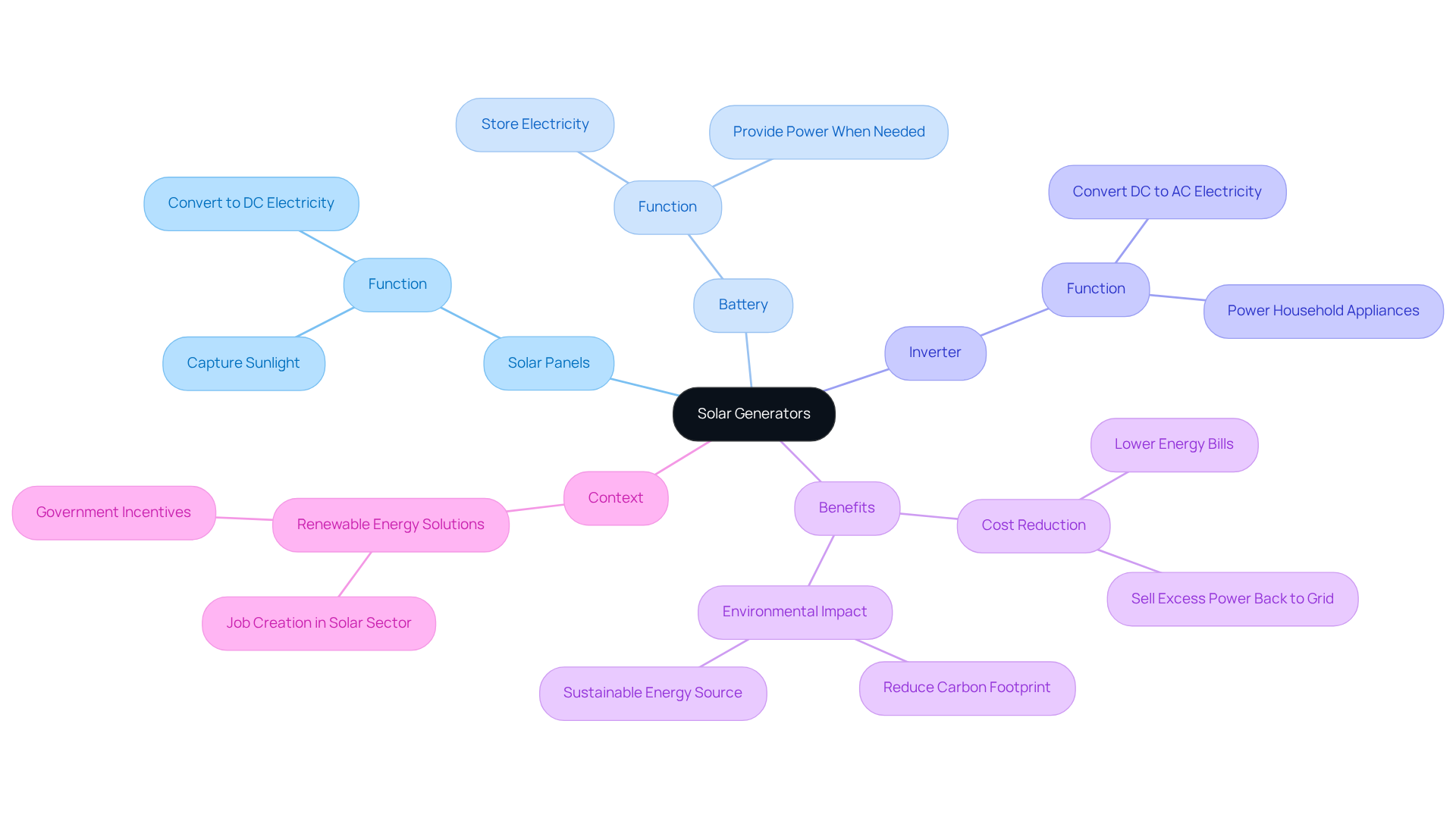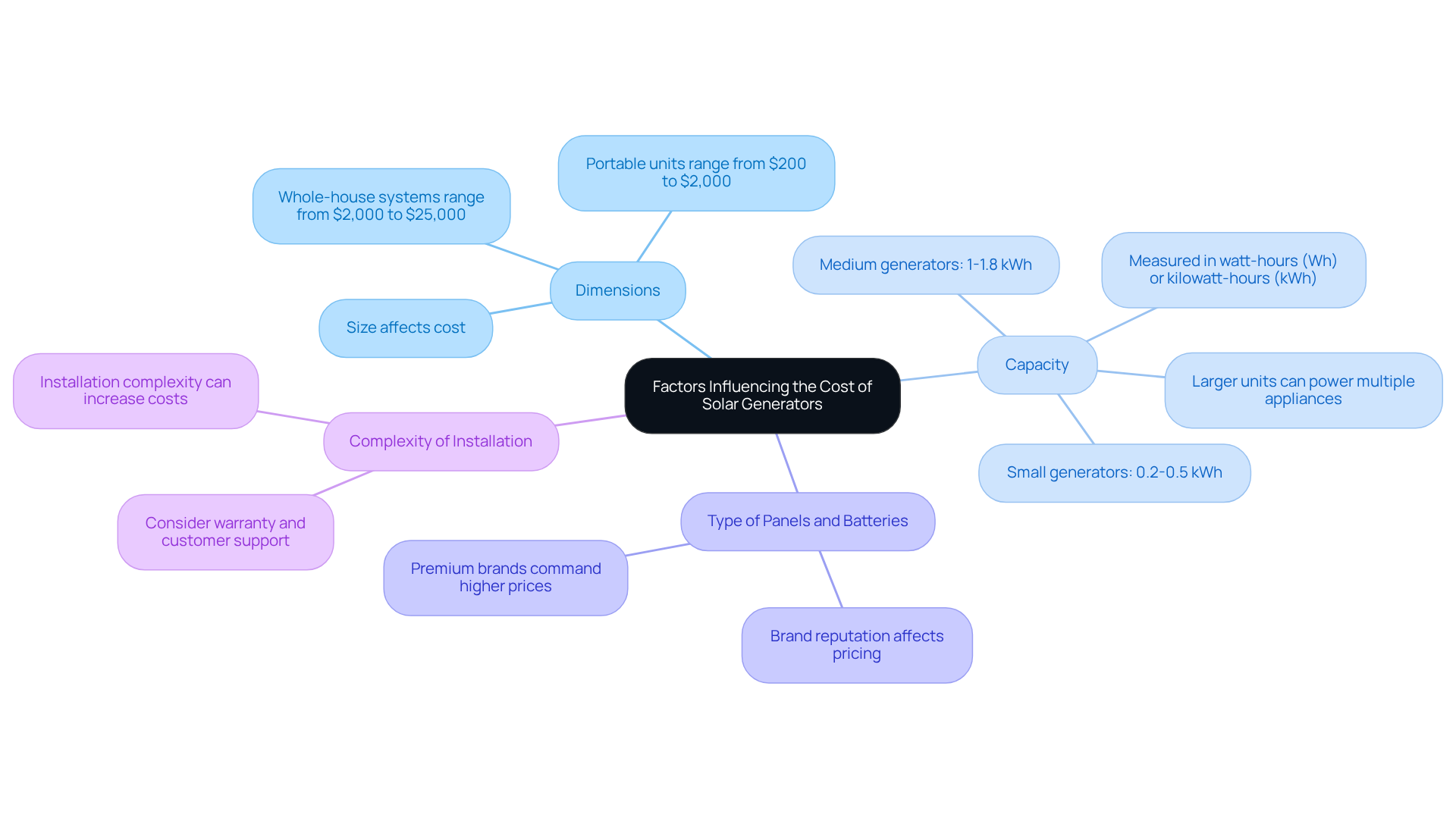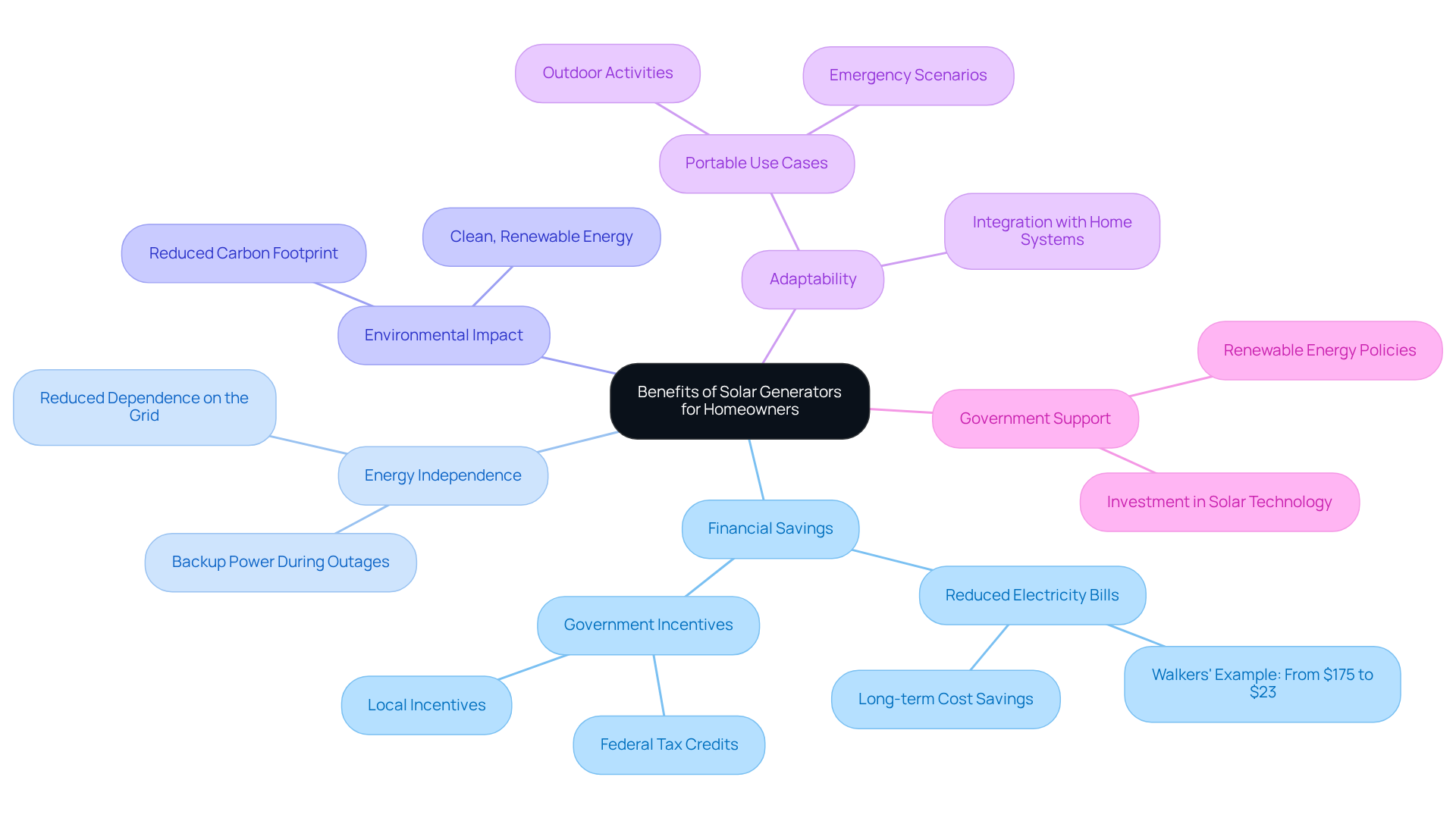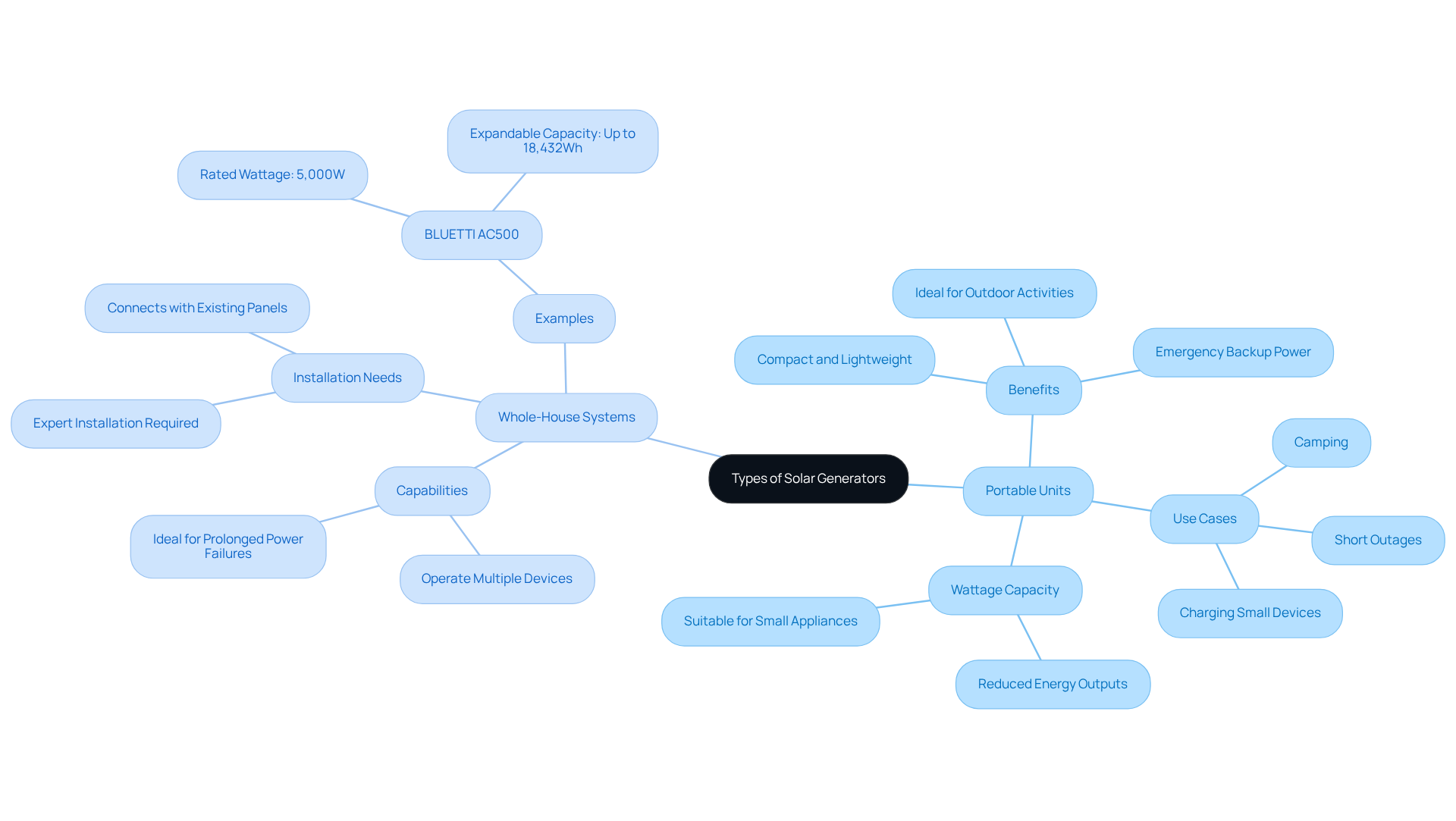Overview
Are you feeling overwhelmed by rising energy bills? You’re not alone. Many homeowners share this concern, and it’s completely understandable. The cost of solar generators for home use can seem daunting at first, influenced by factors such as size, capacity, type of components, and installation complexity. Prices can range from an accessible $200 for portable units to over $25,000 for comprehensive whole-house systems.
However, it’s important to recognize that these factors also reflect the growing accessibility and affordability of solar technology. As more people embrace sustainable energy solutions, the options available to you become increasingly appealing. Imagine the freedom of energy independence, where you can harness the sun’s power to reduce your bills and contribute to a healthier planet.
We understand that making this transition may feel overwhelming, but know that you’re not alone in this journey. Together, we can explore how solar energy can meet your needs and alleviate your concerns. Let’s work towards a brighter, more sustainable future. If you’re ready to take the next step, reach out to us for guidance and support. We’re here to help you every step of the way.
Introduction
As rising energy costs weigh heavily on many homeowners, the search for sustainable solutions has become more urgent than ever. Solar generators stand out as a beacon of hope, transforming sunlight into electricity and providing a clean, renewable energy source. This innovative technology not only offers the potential to significantly reduce reliance on traditional power grids but also fosters a sense of energy independence.
Yet, with the growing interest in solar options, a pressing question arises: what factors influence the cost of solar generators for home use, and how can you, as a homeowner, navigate these choices to maximize your investment?
By exploring these considerations, we can uncover not only the potential savings but also the broader implications for our collective journey towards energy independence and environmental sustainability. Together, we can work towards a brighter, more sustainable future.
Defining Solar Generators: What They Are and How They Work
We understand that rising energy bills can be a significant concern for homeowners. A sunlight generator offers a compassionate solution, transforming sunlight into electricity through three essential components: panels, a battery, and an inverter. The solar panels diligently capture sunlight, converting it into direct current (DC) electricity. This electricity is then lovingly stored in the battery, ensuring that power is available even when the sun isn’t shining. When you need energy, the inverter plays a vital role, converting the stored DC electricity into alternating current (AC) electricity, perfect for powering your household appliances.
As more homeowners seek , understanding the cost of solar generator for home use is becoming increasingly important. They provide of energy that not only reduces dependence on the grid but also helps lower the cost of solar generator for home electricity. With advancements in sunlight-based technology, the efficiency and cost of solar generator for home systems continue to improve, making them a viable choice for many households. In fact, the renewable sector has witnessed substantial growth, with the cost of solar generator for home significantly decreasing over the past decade, making this alternative energy source more accessible than ever.
Experts in the field emphasize the importance of sunlight power in addressing climate change and promoting resource independence. Ramez Naam, for instance, highlights that sunlight energy is essential for meeting our growing energy needs while tackling climate change. Additionally, the modular nature of energy systems allows homeowners to start with a small setup and expand their capacity as needed, providing flexibility to suit various budgets. This adaptability, combined with the potential for significant long-term savings, positions renewable energy systems, particularly the cost of solar generator for home, as an attractive option for environmentally conscious homeowners.
If you’re considering renewable alternatives, residents in Stockton, California, can explore local companies that offer tailored services and products, including high-quality panels for overcast days and efficient battery options for energy storage. Understanding these factors is crucial for making informed decisions about energy investments and enhancing your energy independence. Together, we can work towards a brighter, more sustainable future.
Factors Influencing the Cost of Solar Generators
We understand that can be a significant concern for homeowners. The expense of photovoltaic systems is influenced by several key elements, such as:
- Dimensions
- Capacity
- Type of panels and batteries
- Complexity of installation
For example, portable power units typically range from $200 to $2,000, making them accessible for occasional users. In contrast, whole-house energy systems may cost between $2,000 and $25,000 or more, depending on their energy output and additional features.
It’s important to recognize that the capacity of these systems is measured in watt-hours (Wh) or kilowatt-hours (kWh), with larger units capable of powering multiple appliances or even entire homes. Additionally, brand reputation plays a crucial role in pricing; premium brands often command higher prices due to their established reliability and performance.
As you consider your options, think about factors like warranty, customer support, and efficiency ratings when selecting a power source. Comprehending the cost of solar generator for home pricing dynamics is essential for homeowners like you who are contemplating renewable power solutions. Together, we can navigate these choices to find the best fit for your energy needs.
Benefits of Solar Generators for Homeowners
As homeowners, we often find ourselves grappling with the burden of rising energy bills. The good news is that solar systems offer a dependable source of backup energy during outages, ensuring that essential appliances like refrigerators and medical devices remain operational when the grid fails. Take the Walkers, for instance, a family from Lancaster who experienced a dramatic decrease in their electric bill after installing a renewable system. Their story illustrates how this alternative can significantly ease financial pressures while enhancing reliability.
We understand that power autonomy is a priority, especially in areas prone to outages. Photovoltaic systems can help reduce dependence on the grid, empowering property owners to take control of their utility expenses and understand the cost of solar generator for home. In fact, data shows that the residential sector leads the market for renewable power systems, reflecting a growing movement towards sustainable solutions in our homes.
Moreover, renewable power units can lead to significant reductions in electricity costs, which highlights the cost of solar generator for home use by harnessing the free power from the sun. This transition not only lowers monthly expenses but also aligns with the , including the cost of solar generator for home. The ecological benefits are substantial; photovoltaic devices produce no emissions, contributing to a reduced carbon footprint for our homes.
Additionally, many renewable energy devices are designed to be portable, making them adaptable for outdoor activities or emergency scenarios. This flexibility enhances their appeal, allowing homeowners to utilize renewable energy beyond just residential needs. By incorporating photovoltaic systems into our household power setups, we are making a forward-thinking move towards sustainability and resilience.
Furthermore, government initiatives promoting renewable power adoption can encourage homeowners to invest in these systems, amplifying their benefits. Insights from Tesla home chargers highlight the growing integration of renewable energy technology in contemporary homes, making power systems a vital part of a holistic energy plan. Together, we can embrace this change and work towards a brighter, more sustainable future.
Types of Solar Generators: A Comparative Overview
We understand that many homeowners are concerned about rising energy bills and the cost of solar generator for home as a reliable energy solution. These devices can be categorized into two main types:
- Portable units
- Whole-house systems
Each type offers unique benefits to fit your needs. Portable solar power systems are compact and lightweight, designed for outdoor activities, camping, or emergency backup. While they typically provide reduced energy outputs, they are perfect for charging small devices or operating essential appliances during short outages. For instance, numerous individuals have effectively utilized portable devices during camping excursions or in crisis scenarios, supplying dependable energy for lighting and small electronics.
In contrast, whole-house energy systems, which can include the cost of solar generator for home, are larger setups capable of operating multiple devices simultaneously, making them ideal for home use during prolonged power failures. These systems often necessitate expert installation and can seamlessly connect with existing panel arrangements, enhancing overall efficiency. A great example is the BLUETTI AC500, which boasts a rated wattage of 5,000W and expandable capacity, ensuring that essential household appliances can be supported during outages, providing comfort and safety for your family.
When selecting the right kind of solar device for your home, it’s crucial to consider the cost of solar generator for home along with your specific , including the total wattage of the appliances you intend to operate. Expert recommendations suggest calculating your total wattage needs to ensure the chosen power source can manage the load effectively. It’s common to feel overwhelmed with choices, but understanding the differences in portability and power capacity between these two types of generators is vital for making an informed decision that aligns with your individual energy demands. Together, we can explore the best options to empower your home sustainably.
Conclusion
Understanding the cost of solar generators for home use can feel overwhelming, especially when we consider the rising energy bills that weigh heavily on our budgets. However, these systems offer a transformative approach to managing energy consumption and expenses. They not only provide a reliable energy source but also empower homeowners to take control of their energy independence, contributing to a more sustainable future. By harnessing the sun’s energy, you can significantly reduce your reliance on traditional power sources, alleviating some of the financial stress associated with increasing energy costs.
This article explores various aspects of solar generators, including their components, the factors influencing their costs, and the benefits they offer. It’s important to highlight the modular nature of these systems, allowing for scalability based on your individual needs. Think about the substantial long-term savings you could enjoy. The comparison between portable units and whole-house systems illustrates the versatility of solar generators, catering to diverse energy requirements and preferences.
Ultimately, embracing solar energy solutions is not just a personal investment; it is a step towards a collective commitment to sustainability and environmental responsibility. As the market for solar generators continues to evolve, we encourage you to explore your options, consider the potential savings, and join the movement towards renewable energy. By making informed decisions today, you can contribute to a greener tomorrow while enjoying the numerous advantages that solar technology has to offer. Together, we can create a more sustainable future for ourselves and the generations to come.






